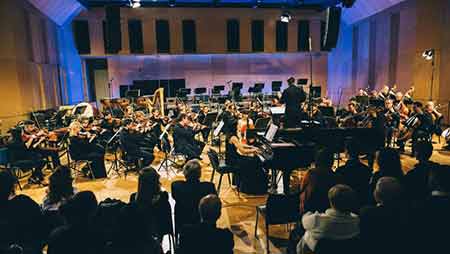16TH INTERNATIONAL MUSICOLOGICAL CONFERENCE
ZAGREB, CROATIA
CALL FOR PAPERS!
Theme:
Place: ZAGREB, CROATIA, THE LIBRARY OF THE CROATIAN ACADEMY OF SCIENCES AND ARTS, STROSSMAYER SQUARE 14
Date: 14–17 MAY 2025
Date: 14–17 MAY 2025
Historians commonly agree that the year 1789 marks the dividing line between the early Modern Age and modern periods. This is also considered the moment when the middle classes gained ground to the detriment of the nobility. However, it goes without saying that the middle class had emerged on the historical horizon of Europe much earlier, and that the nobility did not disappear following its socio-economical marginalization at the beginning of the 19th century.
The ascendancy of the bourgeoisie – partly fueled and fermented by the Napoleonic wars – consisted of numerous phenomena, some of which are directly relevant to the general topic of this Conference. Broadly, these include the ideal of personal freedom, socio-political liberalism and its legal order, industrialization, modernization, and the rise of capitalism, the emergence and affirmation of the public sphere, the development of the educational system, the modern phenomenon of amateurism, and the creation of a specific bourgeois culture, including musical culture.
The main goal of this Conference is to offer a forum for individual research on the identification, documentation, analysis and/or evaluation of various models of private and public initiatives in the field of music, both in European countries and beyond, and the transformation of these initiatives into private or state institutions which subsequently became the foundations of modern bourgeois culture in different times and in various territorial frameworks. These models might be explored through single case studies focusing on: the relationship between prominent musical, scientific and other public figures and political events; relationships which act as decisive factors in the transformation of private initiatives into social organizations; collecting various music material that has become public or is included in public music libraries or printed collections; the private music salon as a model of semi-public music making, of creating standards of quality in music composition and performance; the inclusion of military music in the civilian public music sphere; etc.
THE CONFERENCE INVITES INTERESTED SCHOLARS TO SHARE THE RESULTS OF THEIR RESEARCH WITHIN THE FRAMEWORK OF THE FOLLOWING CATEGORIES:
- · Definitions of ‘bourgeois music culture’
- · Forms and manners of interaction between ‘private’ and ‘public’ in the area of music culture
- · Elements of the bourgeois music culture in the long 18th-century ‘ancien régime’ societies
- · The impact of the industrial revolution on music culture of the bourgeois society in the long 19th century
- · Politics, legislation and music manifestations in the long 19th century
- · Forms of institutionalization of music culture in composition, performance and music schooling in the long 19th century
- · Place and functions of art music in bourgeois music culture
- · The relationship of art and salon/entertainment music in bourgeois music culture in the long 19th century
- · The role and function of military music in society and culture of the long 19th century
KEYNOTE SPEAKERS
- Philipp Ther (Universität Wien)
- Stanislav Tuksar (Croatian Academy of Sciences and Arts, Zagreb)
- Harry White (University College Dublin)
The Conference is planned as an in-person event, but there will be the possibility of online participation.
SUBMISSION OF PROPOSALS AND DEADLINES
Proposals containing a working title and abstract (300–400 words) for a 20-minute paper, accompanied by a short biography of c. 200 words, in Croatian&English or in English, should be submitted on the application form (MS Word in zip) by email, to:
- Croatian Musicological Society, Ante Kovačića Street 5, 10000 Zagreb, Croatia, at the email address:
musinst19hmd@gmail.com - or to the Coordinator (Professor emer. Stanislav Tuksar):
stanislavtuxar@gmail.com
The form should be first downloaded and then filled in before sending!
The deadline for submitting proposals with abstracts is 15 December 2024.
The list of accepted participants will be announced by 15 January 2025.
LANGUAGES
The official languages of the Conference will be Croatian and English.
FEE AND SOJOURN DETAILS
Participants can avail of the ‘early bird’ fee of €80 (or €50 for PhD candidates) before 28 February 2025, or €100 (€70 for PhD candidates) from 1 March until 15 April 2025.
The organizers will provide conference material and refreshments for all participants.
It is expected that travel expenses to and from Zagreb and the accommodation arrangements and expenses will be made and covered by all participants themselves.
PROCEEDINGS
The organizers are planning to publish the Proceedings of the conference with selected papers by mid-2027.
CONTACTS
If needed, please send all other correspondence and queries to the official email address of the Conference as indicated above or to the coordinator Stanislav Tuksar.
ORGANIZING AND PROGRAMME COMMITTEE
- Stanislav Tuksar, Member of the Croatian Academy of Sciences and Arts (Coordinator)
- Koraljka Kos, Member of the Croatian Academy of Sciences and Arts
- Ivan Supičić, Member of the Croatian Academy of Sciences and Arts
- Vjera Katalinić, Department for History of Croatian Music of the Croatian Academy of Sciences and Arts
- Lucija Konfic, Department for History of Croatian Music of the Croatian Academy of Sciences and Arts
- Petra Babić, Croatian Catholic University
- Marija Benić Zovko, Department for History of Croatian Music of the Croatian Academy of Sciences and Arts (Secretary)



